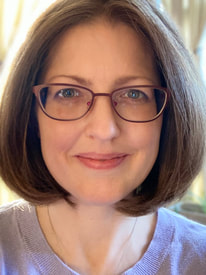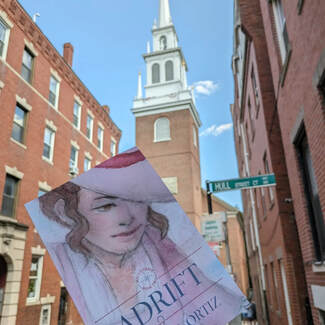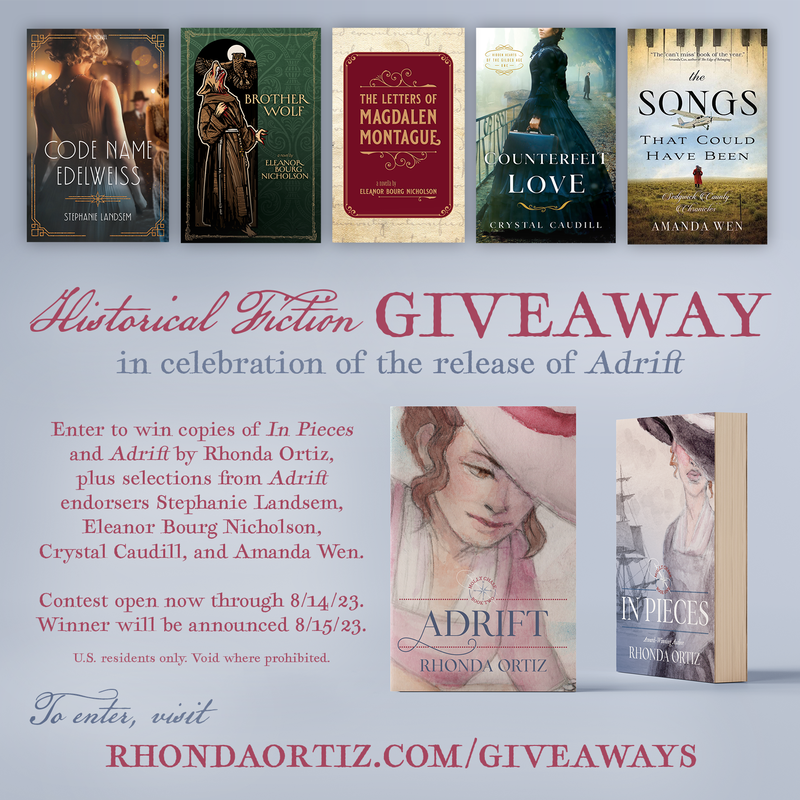|
Good morning, friends! I'm so excited today to welcome Rhonda Ortiz, author of the historical novel In Pieces and its sequel, Adrift, which releases today (8/8)! You guys are going to love reading what Rhonda has to say about her writing and life--I had so much fun with this! Before we get started, here's a little more about Rhonda: Rhonda Ortiz is a lay Dominican, award-winning novelist, nonfiction writer, and founding editor emerita of Chrism Press. A native Oregonian, she attended St. John’s College in historic Annapolis, Maryland and now lives in Michigan with her husband and children. Find her online at rhondaortiz.com. FEH: Welcome, Rhonda! I've read so many books about the American Revolution or about the Napoleonic Wars from French or English perspectives, but In Pieces and Adrift are two of very few I've read set in America during the 1790's. What was it about that time period and location that first sparked a story? RO: Great question. My first attempt at writing Molly Chase’s story was set in 1770s England with an entirely different cast of characters—not even Josiah Robb was there, if you can believe it. Frankly, that story stank. It had a properly structured plot, but the characters had zero chemistry, and I knew deep down that I was missing something fundamental. The Robb family, back in Boston, hovered on the fringes of my imagination, and as soon as I let them into that story, Molly herself came alive. So that was Step One. Step Two came of researching the time period. Josiah is a sailor, of course, and when I learned that over ten thousand American merchant sailors were pressed into British naval service during the French revolutionary wars, I knew I had my time period. FEH: You jump into the historical time and place in such an immersive way in your stories, and you particularly brought the relatively obscure worlds of dressmaking, sailing, and early espionage to vivid life. What area of research required the most effort from you? Which did you enjoy the most? RO: My answer is the same for both questions: everything related to nautical life! The Age of Sail lends itself to romantic visions of men perched upon topgallant masts, the wide sea stretched before them in all directions. But the reality…and the details… I had to learn to sail in my head in order to write Adrift, and what was more, I couldn’t always take the easy way out by writing the sailing scenes from the lubber’s point of view. Writing from Josiah’s viewpoint meant getting both the language and the sailing itself right. Sailing in general has its own jargon, quite thick and difficult to learn, and sailors can be persnickety about its usage. I don’t know what I would have done without my boating beta reader! This said, I’m right proud of myself for having learned as much as I have. FEH: What was your favorite bit of research that never made it into your story? RO: Going back to that failed 1770s English-set story: I learned a fair amount about the history of recusant Catholic families in England. Maybe someday I’ll work that up into a story. FEH: As a Catholic writer, what were the challenges of writing devout, non-Catholic characters? RO: I’m a convert, so writing Protestant points of view is like speaking my native tongue. The greatest challenge is the translation problem: how does one depict various Protestant ways of thinking and being in a manner that makes sense to Catholic readers and doesn’t repulse them? That evangelical fiction is “preachy” is a common cant, but I suspect the problem is largely cultural. Much—not all—of Protestant Christianity tends to be heavily dialectical in its expression, which is not the case for Catholic and Orthodox Christians. What sounds “preachy” to everyone else is perfectly normal for them. In the end, I decided the best approach was to show Protestants as they are, as expressed by each individual character, with respect to denominational differences, and keeping in mind both the religious landscape of late eighteenth century Boston and the influence of various Enlightenment philosophies on religion. Josiah and his mother, as Congregationalists, like to discuss and debate; Molly, as an Anglican, lends more toward liturgical and spiritual experience. And so on. FEH: I've heard romantic stories (including the works of Austen, Montgomery, and Alcott) criticized as setting up unrealistic expectations of what a relationship should look like. I was thinking about those comments as I read your story, which constantly struck me as a realistic view of courtship and marriage, touched with an optimistic joy and hope. (I guess I'm showing my cards here, since I think optimism and realism go hand in hand.) What would your response be to such comments? RO: As a woman writer, the best way to curb romantic idealism is for me to ask my husband for his feedback. I have to chuckle at the number of times Jared has told me, “A dude wouldn’t do that.” For male writers, the reverse is true. Female archetypes abound—the angel, the mother, the temptress, the femme fatale, Action Girl, etc.—which are also romantic ideals. Archetypes, male or female, are but a starting place; the challenge is to go beyond the archetype by allowing each individual character to act as each he or she would in real life. I have also found it helpful to frank about male sexuality, which many romances gloss over. I maintain a light touch in terms of its depiction, but I do acknowledge it. The secondary cast of characters have been particularly helpful here, particularly Mark Findley, Josiah’s raffish friend. Finally, a few rapid-fire questions:
FEH: Who's your favorite Doctor of the Church? RO: St. Thomas Aquinas! FEH: What's your favorite pizza topping? RO: All of them? I’m an equal opportunity pizza eater, and that includes Canadian bacon and pineapple. My New York Italian-Puerto Rican husband thinks pineapple on pizza is an abomination. I suppose he’s allowed to be an expert on these things, but, hey, sweet and savory is a great combo. Right? FEH: Mountains or shore ? The Oregon coast is my happy place—and that counts for both mountains AND shore! FEH: Three authors you admire greatly? RO: Sigrid Undset, Patrick O’Brian (a recent discovery), and too many contemporary authors to name: Roseanna White, Stephanie Landsem, Jocelyn Green, Eleanor Bourg Nicholson, Karen Ullo, Natalie Morrill… Another favorite book of mine is Catherine Marshall’s Christy. I also love children’s author Elizabeth George Speare. There’s a little bit of Nat Eaton in Josiah Robb, not going to lie. FEH: Thanks so much, Rhonda! This interview was a lot of fun! RO: Thank you for allowing me to share about my writing! It was my pleasure! Remember, everyone, today is Adrift's RELEASE DAY! Join Rhonda Ortiz in celebration of Adrift by entering the GIVEAWAY and joining the Virtual Launch Day party on Instagram; here's the link to her profile over there: @writingrhonda. Giveaway: rhondaortiz.com/giveaways Launch Day Post: rhondaortiz.com/blog/adrift-is-here #MollyChaseAdrift #MollyChaseSeries
1 Comment
8/12/2023 05:13:59 pm
Faith and Rhonda, thank you for a most delightful interview. I wouldn't know a thing about sailing and think it'd be very challenging to write something that has its own language, so to speak. Congratulations Rhonda!!! Faith has introduced me to many new-to-me authors.
Reply
Leave a Reply. |
About meHi! I'm Faith. I blog about books and creativity, family and faith. Welcome! Archives
November 2023
Categories
All
|



 RSS Feed
RSS Feed